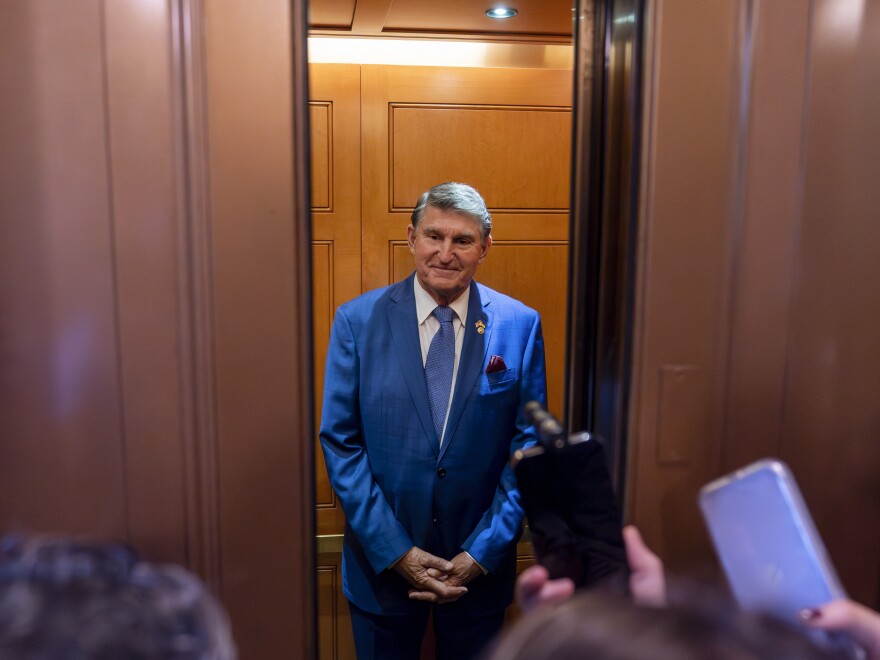Updated November 10, 2023 at 9:57 AM ET
West Virginia Democratic Sen. Joe Manchin announced Thursday that he will not run for reelection in 2024.
The long-awaited decision by the red-state Democrat means the party faces an uphill climb to keep its narrow majority in next year's election.
Democrats already faced a tough map in 2024 to keep control of the U.S. Senate. They have 23 seats on the ballot and the most contested ones are in the Republican-leaning states of Ohio, Montana and West Virginia.
Manchin, who's 76, says he accomplished what he set out to do for his home state. But he added he's not done with politics.
"I will finish my term while traveling the country and speaking out to see if there is interest in building a movement to mobilize the middle, find common ground, and bring Americans together," Manchin said in a video posted online.
Manchin has previously suggested he might be open to a third-party bid for president. He has appeared at events for the group No Labels as it explores what it calls a potential "unity" presidential ticket.
Manchin had faced a tough reelection fight in his home state. High-profile West Virginia Republicans were already running against him, including Gov. Jim Justice and Rep. Alex Mooney. The head of the Senate GOP's campaign committee, Montana Sen. Steve Daines, released a statement saying "we like our odds in West Virginia."
A key centrist in the Senate
In recent years, Manchin found himself increasingly out of step with the rest of his party. That became apparent in December 2021 when he said he wouldn't support President Biden's roughly $2 trillion social and climate spending legislation known as Build Back Better, a decision for which he was roundly criticized.
Manchin was a key player, though, in the passage of the Inflation Reduction Act, which included historic climate investments, and he voted with his party nearly 90% of the time.
In an op-ed in The Wall Street Journal explaining his decision not to seek reelection, Manchin accused his fellow Democrats of putting "politics over the will of the people" on abortion because, in his view, they didn't support a bill he introduced codifying Roe v. Wade, the 1973 Supreme Court decision that legalized abortion nationwide, into law. The Supreme Court struck down Roe last year, leaving the issue up the states.
In the op-ed, Manchin also accused Republicans of putting "politics over the will of the people" because they didn't support his measure to overhaul energy permitting.
"Like the Democrats on abortion, Republicans refused to take yes for an answer," he wrote. "Both events demonstrated the kind of self-defeating political tribalism that has become all too common in Washington."
In his announcement, Manchin did not rule out a third-party run for president.
Any such move could hurt Biden's bid for reelection.
In a statement Thursday, Biden praised Manchin and his "service to West Virginia and to our country," and highlighted their work "together to get things done for hardworking families."
The move leaves a big hole for West Virginia Democrats
Since Manchin first arrived in Washington in 2010 following the death of Sen. Robert C. Byrd, West Virginia has gone from a Democratic stronghold to deeply red. These days, he's the lone Democrat to hold statewide office – and the only one from his party representing the state in Washington.
As a moderate who has leaned conservative on some issues, he's been a pivotal vote — deciding everything from judicial appointments to changing the dynamics of key legislation.
During the Trump administration, Manchin was the only Democrat to support Supreme Court Justice Brett Kavanaugh's confirmation. And along with the Inflation Reduction Act under Biden, Manchin also helped make the long-stalled Mountain Valley Pipeline a reality, working with Republicans to expedite that pipeline's permit by including it in a bill to lift the nation's debt ceiling.
State Sen. Mike Caputo – whose district includes Manchin's hometown – said Manchin's power has at times usurped the president's.
"The most powerful Joe in Washington is not Joe Biden — it's Joe Manchin — because he really held the big stick in the Senate and was able to maneuver and able to — I hate to use the word 'play' — but able to work the system as well as anybody," Caputo said.
Political science professor and director of West Virginia University's Institute for Policy Research and Public Affairs Sam Workman said he sees Manchin's record as setting a standard that'll be difficult to match.
"Manchin was an incredibly agile and skilled politician – the likes the state has not seen for a while – and there's not really any sort of way to replace that in the short term," Workman said.
As for West Virginia Democrats, Manchin's decision to not seek reelection leaves the party without an obvious candidate to rally behind.
"In the coming months, we will engage in a robust process to identify and support a candidate who truly represents the values of West Virginia," West Virginia Democratic Party chairman Mike Pushkin said in a statement.
NPR's Dave Mistich and Barbara Sprunt contributed to this report.
Copyright 2023 NPR. To see more, visit https://www.npr.org.




